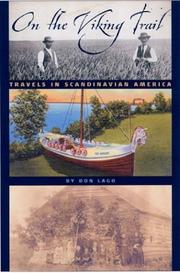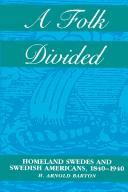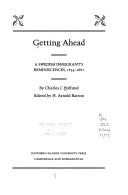| Listing 1 - 10 of 12 | << page >> |
Sort by
|
Book
ISBN: 1536192422 9781536192421 9781536192131 Year: 2021 Publisher: New York
Abstract | Keywords | Export | Availability | Bookmark
 Loading...
Loading...Choose an application
- Reference Manager
- EndNote
- RefWorks (Direct export to RefWorks)
"The Swedes did not have a real feudal system, since their lands were not fertile enough for the peasants to spare more than a small portion of their crops in order to maintain the wellbeing of the nobility. Swedish peasants were mostly free and, in 1434, gained real political status. In 1471 a dispute occurred in Sweden and peasants and citizens, led by a nobleman from Stockholm named Sten Sture, who desired a separate Swedish state. Sture and his comrades won the battle. Sture became a hero in the Swedish collective memory, ruled Sweden, and fought successfully against the Russians. In 1520 King Christian II of Denmark defeated and killed the Swedish King Sten Sture den Yngre (the Younger) and became king of Sweden, but the Swedish army, led by a nobleman named Gustav Vasa, drove Christian II from Sweden in 1523. At the time, the vast majority of Swedish lands were owned by peasants. Vasa and his descendants, who ruled the country and waged war on the Baltic shores and into European soil, gave the Swedish nobility and wealthy individuals a political status. These kings relied on the multiple wars' outcomes to further their national enterprise and develop a Swedish national identity among strata of the wider population. That spirit of nationality, together with the cherished Swedish values of freedom and enterprise, enabled a successful campaign by King Gustavus Adolphus and his prime minister between 1626 and 1648. Yet after that war, when Sweden was accepted as a major European power, the Swedes understood that their resources would not allow them to play a central role in any future conflict, and they began to pursue a course of neutrality that continued throughout the two World Wars. During the years of Europe's consolidation, the historical lessons learned by the Swedes culminated in a realization that they could not maintain an independent role in European "jungle politics" and that their attempts at neutrality could even prove dangerous. After much hesitation, they jumped into the European "swimming pool" and have remained floating there quite comfortably. The Swedes feel comfortable within the EU and would prefer to stay there in the future, adapting to the notion of a European nationality"--
Swedes --- National characteristics, Swedish. --- History. --- Sweden --- Civilization.
Book
ISBN: 1628951184 1609173236 9781609173234 9781628961188 162896118X 9781611860412 1611860415 Year: 2012 Publisher: East Lansing Michigan State University Press
Abstract | Keywords | Export | Availability | Bookmark
 Loading...
Loading...Choose an application
- Reference Manager
- EndNote
- RefWorks (Direct export to RefWorks)
In the late nineteenth and early twentieth centuries, large numbers of Swedish immigrants came to Michigan seeking new opportunities in the United States and relief from economic, religious, or political problems at home. In addition to establishing early farming communities, Swedish immigrants worked on railroad construction, mining, fishing, logging, and urban manufacturing. As a result, Swedish Americans made significant contributions to the economic and cultural landscape of Michigan, a history this book explores in engaging and illustrative depth. Swedes in Michigan traces the evolution
Immigrants --- Swedish Americans --- Swedes --- Swedish people --- Ethnology --- Scandinavians --- History.
Book
ISBN: 1442695153 1442695145 Year: 2018 Publisher: Toronto : University of Toronto Press,
Abstract | Keywords | Export | Availability | Bookmark
 Loading...
Loading...Choose an application
- Reference Manager
- EndNote
- RefWorks (Direct export to RefWorks)
Using extensive archival and demographic research, Barr explores both the impressive Swedish legacy in Canada and the reasons for their invisibility as an immigrant community.
Swedish Canadians --- Swedes --- History. --- Canada --- Sweden --- Emigration and immigration.

ISBN: 1587294834 9781587294839 0877458928 9780877458920 Year: 2004 Publisher: Iowa City University of Iowa Press
Abstract | Keywords | Export | Availability | Bookmark
 Loading...
Loading...Choose an application
- Reference Manager
- EndNote
- RefWorks (Direct export to RefWorks)
When his father developed Alzheimer's disease, Don Lago realized that the stories and traditions of his Swedish ancestors would be lost along with the rest of his father's memories. Haunted by this inevitable tragedy, Lago set out to fight back against forgetting by researching and reclaiming his long-lost Scandinavian roots.
Swedish Americans --- Swedish Americans. --- Ethnology --- Swedes --- Lago, Don, --- Lago, Donald Russell, --- Travel.

ISBN: 080938048X 129913243X 144161933X 9781441619334 9780809320479 0809320479 9780809380480 Year: 1996 Publisher: Carbondale Published for Swedish Pioneer Historical Society by Southern Illinois University Press
Abstract | Keywords | Export | Availability | Bookmark
 Loading...
Loading...Choose an application
- Reference Manager
- EndNote
- RefWorks (Direct export to RefWorks)
""America fever"" gripped Sweden in the middle of the nineteenth century, seethed to a peak in 1910, when one-fifth of the world's Swedes lived in America, cooled during World War I, and chilled to dead ash with the advent of the Great Depression in 1930.Swedish Exodus, the first English translation and revision of Lars Ljungmark's Den Stora Utvandringen, recounts more than a century of Swedish emigration, concentrating on such questions as who came to America, how the character of the emigrants changed with each new wave of emigration, what these people did w
Swedish Americans. --- Swedish Americans --- Ethnology --- Swedes --- United States --- Emigration and immigration. --- Immigration

ISBN: 0585114463 9780585114460 0809319438 9780809319435 0809319446 9780809319442 Year: 1994
Abstract | Keywords | Export | Availability | Bookmark
 Loading...
Loading...Choose an application
- Reference Manager
- EndNote
- RefWorks (Direct export to RefWorks)
In this unique longitudinal study of how a divided people relate to one another, H. Arnold Barton outlines dilemmas created by the great migration of Swedes to the United States from 1840 through 1940 and the complex love-hate relationship that resulted between those who stayed and those who left. During that hundred-year period, one Swede out of five voluntarily immigrated to the United States, and four-fifths of those immigrants remained in their new country. This study seeks to explore the far-reaching implications of this mass migration for both Swedes and Swedish Americans.The Swedes were a literate, historically aware people, and the 1.2 million Swedes who immigrated to the United States offer a particularly well-documented and illuminating case study. Barton has skillfully woven into the text translations of little known published and unpublished Swedish sources from both sides of the Atlantic, to embody--in haunting human terms--both what was gained and what was lost through emigration.Past studies have traditionally shown ethnic mobilization to be a defensive reaction against the exclusive nativism of resident Americans. Barton convincingly demonstrates, however, that the creation of a distinctive Swedish-American identity was at least equally an expression of the immigrants' need to justify leaving their homeland to their former compatriots and to themselves by asserting a rightful and unique place within the Swedish national community. He concludes that the relationship between Swedes and Swedish Americans was essentially similar to that experienced by other peoples divided by migration, and that the long debate over the United States and emigration at its deepest level reveals both hopes and fears most conspicuously symbolized by America and "Americanization" in an increasingly integrated world undergoing the relentless advance of modernization.
Swedish Americans --- Ethnic identity. --- Sweden --- Emigration and immigration --- History. --- Ethnology --- Swedes --- Kingdom of Sweden --- Konungariket Sverige --- Schweden --- Shvet︠s︡ii︠a︡ --- Suecia --- Suède --- Suwēden --- Sverige --- Svezia --- Szwecja --- Zviedrija --- Zweden --- スウェーデン --- SWEDEN --- Social science --- History

ISBN: 0585039526 9780585039527 0809315211 9780809315215 Year: 1989 Publisher: Carbondale Southern Illinois University Press
Abstract | Keywords | Export | Availability | Bookmark
 Loading...
Loading...Choose an application
- Reference Manager
- EndNote
- RefWorks (Direct export to RefWorks)
Swedish Americans --- Immigrants --- Ethnic & Race Studies --- Gender & Ethnic Studies --- Social Sciences --- Emigrants --- Foreign-born population --- Foreign population --- Foreigners --- Migrants --- Persons --- Aliens --- Ethnology --- Swedes --- Biography --- Hoflund, Charles J. --- Hoflund, Carl Johan, --- United States --- Sweden --- Kingdom of Sweden --- Konungariket Sverige --- Schweden --- Shvet︠s︡ii︠a︡ --- Suecia --- Suède --- Suwēden --- Sverige --- Svezia --- Szwecja --- Zviedrija --- Zweden --- スウェーデン --- Emigration and immigration --- History
Book
ISBN: 0585333262 9780585333267 9780809321049 9780809382491 0809382490 Year: 1999 Publisher: Carbondale, Ill. Edwardsville Southern Illinois University Press
Abstract | Keywords | Export | Availability | Bookmark
 Loading...
Loading...Choose an application
- Reference Manager
- EndNote
- RefWorks (Direct export to RefWorks)
Previously available only in an out-of-print Swedish edition published in 1955, Henry Bengston's firsthand account deals with what historian Dag Blanck calls the "other Swedish America."Swedish immigrants in general were conservative, but Bengston and othersmost notably Joe Hilljoined the working-class labor movement on the left, primarily as Debsian socialists, although their ranks included other socialists, communists, and anarchists. Involved in the radical labor movement on many fronts, Bengston was the editor of Svenska Socialisten from 1912 until he dropped out of the Scandinavian Socialist Federation in 1920. Even after 1920, however, his sympathies remained with the movement he had once strongly espoused.
Socialism --- Labor movement --- Swedish Americans --- Journalism, Socialist --- Ethnology --- Swedes --- Marxism --- Social democracy --- Socialist movements --- Collectivism --- Anarchism --- Communism --- Critical theory --- Socialist journalism --- History --- Bengston, Henry. --- E-books --- ETHNOLOGY --- LABOR MOVEMENT --- JOURNALISM, SOCIALIST --- SOCIALISM --- SOCIAL SCIENCE --- POLITICAL SCIENCE --- LANGUAGE ARTS & DISCIPLINES --- Labor Movement --- Social Science --- Political Science --- Language Arts & Disciplines --- Journalism --- Political science --- Social science
Book
ISBN: 1628950749 1609173252 9781609173258 9781628960747 1628960744 9781628950748 161186030X 9781611860306 Year: 2012 Publisher: East Lansing : Michigan State University Press,
Abstract | Keywords | Export | Availability | Bookmark
 Loading...
Loading...Choose an application
- Reference Manager
- EndNote
- RefWorks (Direct export to RefWorks)
Who are the Finland-Swedes? Defined as citizens of Finland with a Swedish mother tongue, many know these people as "Swede- Finns" or simply "Swedes." This book, the first ever to focus on this ethnolinguistic minority living in Michigan, examines the origins of the Finland-Swedes and traces their immigration patterns, beginning with the arrival of hundreds in the United States in the 1860's. A growing population until the 1920's, when immigration restrictions were put in place, the Finland-Swedes brought with them unique economic, social, cultural, religious, and political institutions, explore
Finns --- Finnish Americans --- Finland-Swedes --- Ethnology --- Finlanders --- Finnish people --- Finno-Ugrians --- Finnish Swedes --- Finns, Swedish-speaking --- Swedish Finns --- Swedish-speaking Finns --- History. --- Social conditions. --- Michigan --- Finland --- Mishigen --- State of Michigan --- MI --- SOM --- MC --- Mich. --- ميشيغان --- Mīshīghān --- Michigan suyu --- Miçiqan --- Штат Мічыган --- Shtat Michyhan --- Мічыган --- Michyhan --- Мичиган --- Míshigin Hahoodzo --- Μίσιγκαν --- Misinkan --- Miĉigano --- Miŝigano --- Ŝtato de Miĉigano --- Me̳t-hiet-kîn --- 미시간 주 --- Misigan-ju --- 미시간 --- Misigan --- Mikikana --- מישיגן --- מדינת מישיגן --- Medinat Mishigen --- Michigania --- Mičigana --- Mičiganas --- Мичиген --- Mičigen --- ミシガン州 --- Mishigan-shū --- Mishigan --- ミシガン --- Мічиган --- Штат Мічиган --- Michigan Shitati --- Mėčėgans --- 密歇根州 --- Mixiegen Zhou --- 密歇根 --- Mixiegen --- 密西根州 --- Mixigen zhou --- 密西根 --- Mixigen --- Michigan Territory --- Fen-lan --- Fen-lan kung ho kuo --- Finlande --- Finlândia --- Finlandii︠a︡ --- Finli︠a︡ndii︠a︡ --- Finnland --- Finnlando --- Finrando --- Republic of Finland --- Republiken Finland --- Souomi --- Suomen tasavalta --- Suomi --- פינלנד --- フィンランド --- Finland (Grand duchy) --- Emigration and immigration --- Ethnic relations --- Finland (Grand Duchy)
Book
ISBN: 1978813155 9781978813151 9781978813113 1978813112 9781978813120 1978813120 9781978813137 1978813139 Year: 2022 Publisher: New Brunswick, New Jersey
Abstract | Keywords | Export | Availability | Bookmark
 Loading...
Loading...Choose an application
- Reference Manager
- EndNote
- RefWorks (Direct export to RefWorks)
"Separate Paths: Lenapes and Colonists in West New Jersey is the first cross-cultural study of European colonization in the region south of the Falls of the Delaware River (now Trenton). Lenape men and women welcomed their allies, the Swedes and Finns, to escape more rigid English regimes on the west bank of the Delaware, offering land to establish farms, share resources, and trade. In the 1670s, Quaker men and women challenged this model with strategies to acquire all Lenape territory for their own use and to sell as real estate to new immigrants. Though the Lenapes remained sovereign and "old settlers" retained their Swedish Lutheran religion and ethnic autonomy, the West Jersey proprietors had considerable success in excluding Lenapes from their land. The Friends believed God favored their endeavor with epidemics of smallpox and other European diseases that destroyed Lenape families and communities. Affluent Quakers also introduced enslavement of imported Africans and Natives-and the violence that sustained it-to a colony they had promoted with the liberal West New Jersey Concessions of 1676-77. Thus, they defied their prior experience of religious persecution and their principles of peaceful resolution of conflict, equality of everyone before God, and the golden rule to treat others as you wish to be treated. Despite mutual commitment to peace by Lenapes, old settlers, and Friends, Quaker colonization had similar results to military conquests of Natives by English in Virginia and New England, and Dutch in the Hudson Valley and northern New Jersey. Still, in alliance with old settlers, Lenape communities survived in areas outside the focus of English colonization, in the Pine Barrens, upper reaches of streams, and Atlantic shore"--
Quakers --- White people --- Delaware Indians --- History --- Relations with Indians --- History. --- Land tenure --- Government relations. --- New Jersey --- Race relations --- Ethnic relations --- Lenape, Leni Lenape, Lenni Lenape, Delaware Indians, Indian, Native: Native American, American Indian, Swedish, Swedes, Lutheran, Lutheran Church, Swedish Lutherans, Quakers, Society of Friends, Friends Church, West New Jersey, New Jersey, West NJ, NJ, colonization, colony, conquest, land, disease, wealth, exclusion, Indigenous, alliance, real estate, separation.
| Listing 1 - 10 of 12 | << page >> |
Sort by
|

 Search
Search Feedback
Feedback About UniCat
About UniCat  Help
Help News
News